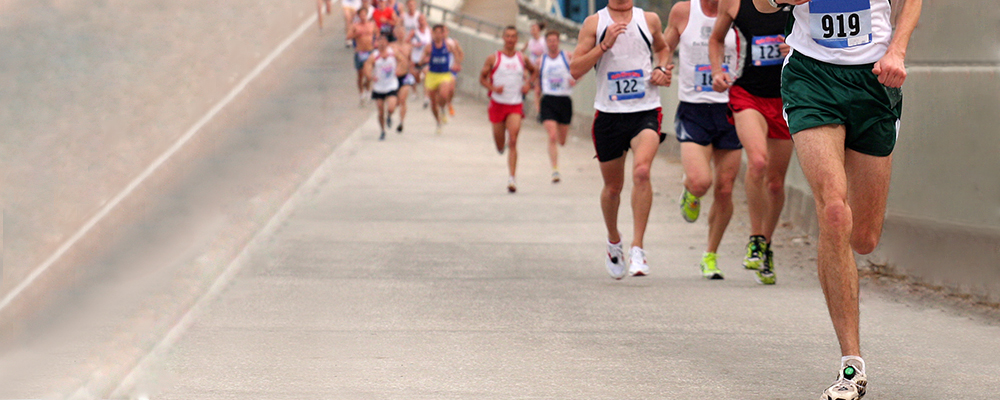Endurance Champions Don’t Play Without Protein
During exercise your muscles contract and relax vigorously whilst bearing a significant load for an extended period of time. This mechanical stress is a hefty burden for your muscles to cope with and eventually leads to muscle damage. 1 The excessive amount of exercise you endure may require increased amounts of protein to facilitate muscle repair and recovery2 and without sufficient protein for muscle repair, you may be off the road for longer while waiting for your muscles to heal. In general, endurance athletes should aim to consume 1.2 g to 1.4 g of protein per kilogram bodyweight each day, for optimal performance and recovery.3 It is important to consume protein before, during and after endurance exercise for best results.
Your body may indeed be pleading for protein whilst on the go to enable you to maintain peak performance for longer. Taking a small amount of protein with a moderate amount of carbohydrates during exercise has been shown to improve performance and reduce markers of muscle damage more effectively than carbohydrates alone.4[iv] It’s not uncommon for athletes to fail to optimize their athletic ability because they overlook their protein intake. By providing your body with adequate amounts of protein before, during and after exercise, you may support a speedy recovery and enhance your endurance capacity.
Protein is a Pricey Source of Fuel
Protein can be used as a source of energy when your body is running low on other options, but it is not ideal as it comes with a significant price. Your muscle cells prefer to use carbohydrates to provide energy for your working muscles because they are easier to metabolise and convert to fuel. Your body can convert protein to glucose and then to energy during prolonged, strenuous exercise, particularly if carbs are becoming scarce. However, the problem with protein being used as a source of fuel is that it may be extracted from your muscles, causing damage and hampering performance. In addition, when proteins are broken down to produce energy, ammonia is formed as a by-product. As ammonia accumulates within muscle cells, fatigue can kick in rapidly.

To prevent your body from breaking down muscle tissue for energy, to fight off fatigue and to maintain optimal endurance capacity, provide your body with carbohydrates and protein during a race. The ideal fuelling option for endurance exercise, particularly for events lasting longer than two hours, is to combine a well-absorbed (highly bioavailable) protein source along with carbohydrates in appropriate ratios (i.e. 6:1 of carbohydrates to protein). Combining protein with carbohydrates enables the carbs to be used as the primary fuel source, while the protein helps to prevent muscle break-down, as well as helping to support muscle synthesis and extend athletic ability.5 During prolonged, strenuous exercise, make sure you are protecting your muscle tissue and endurance performance by taking highly bioavailable protein and carbohydrates.
Endura Optimizer - The Perfect Protein Blend
If protein supplementation is so important for endurance athletes, you may be wondering what is the best form to use? Endura Optimizer is an easy-to-digest protein blend that is ideal for use before, during and after an event. It contains a balanced ratio of protein and carbohydrates along with electrolytes, providing a superb source of metabolic fuel for your working muscles, to keep you moving faster for longer. The protein component of Endura Optimizer is hydrolysed whey protein isolate, the most bioavailable form of protein available. Bioavailability becomes important during endurance events as digestive function decreases significantly once the race duration increases to more than an hour. During that all-important race event, the last thing you want affecting your focus is an increased risk of developing a digestive upset from a poorly absorbed protein supplement. With Endura Optimizer, not only is the protein source highly bioavailable but the carbohydrate to protein ratio of 6:1 further improves digestibility.
Endura Optimizer comes in three delicious flavours: chocolate, vanilla and banana. Table One below outlines the most effective way to take Endura Optimizer to help you achieve your sporting goals for carbohydrate loading, pre-race loading, mid-race fuelling and post-race recovery:
Table One – How to take Endura Optimizer.
|
Adults: Serving suggestion
|
To make 1 serve, mix 4 level scoops with 500 mL of water.
|
|
For optimal carbohydrate loading prior to race day
|
Drink up to 3 serves per day for 3 days leading up to the event.
|
|
For optimal loading on race day
|
Drink 1 serve (500 mL) 2 hours to 30 minutes prior to exercise.
|
|
For optimal endurance during training and racing
|
For exercise over 2 hours in duration, drink ½ serve (250 mL) each hour beyond the 2 hour mark. A maximum of 9 full serves per day should not be exceeded.
|
|
For optimal recovery after endurance training and racing
|
Drink 1 serve (500 mL) within 4 hours after exercise and 1 serve before bed.
|
If you are looking for that secret strategy to make sure you are making the most of your protein supplementation, go no further than Endura Optimizer.
Race Recovery Protein Smoothie
If you’re looking for new and exciting ways to get protein into your body after those punishing training sessions, here is a delicious and nutritious recipe for you to try:
Banana-Berry Protein Smoothie
Ingredients:
1 cup of almond or coconut milk
1 banana
½ cup of mixed frozen berries
2 level scoops of vanilla Endura Optimizer
2 tablespoons of chia seeds
2 tablespoons of natural Greek yogurt
Method:
Simply blend all of the ingredients together in a high-powered blender and serve. If the smoothie is too thick, add a little more almond or coconut milk until you reach the desired consistency. Enjoy!
References:
1 Clarkson P, Hubal M. Exercise-induced muscle damage in humans. Am J Phys Med Rehabil. [Online]. 2002: Available from: http://eclass.uth.gr/eclass/modules/document/file.php/ANTMA124/Supporting%20Material/Lecture%201i.pdf. [Cited 12/8/15].
2 Lemon P. Effects of exercise on dietary protein requirements. International Journal of Sport Nutrition. [Online]. 1999: Available from: http://www.researchgate.net/profile/Peter_Lemon/publication/13445647_Effects_of_exercise_on_dietary_protein_requirements/links/54e623bd0cf2bff5a4f37a71.pdf. [Cited 12/8/15].
3 Lemon P. Effects of exercise on dietary protein requirements. International Journal of Sport Nutrition. [Online]. 1999: Available from: http://www.researchgate.net/profile/Peter_Lemon/publication/13445647_Effects_of_exercise_on_dietary_protein_requirements/links/54e623bd0cf2bff5a4f37a71.pdf. [Cited 12/8/15].
4 Saunders MJ, Kane MD, Todd MK. Effects of a carbohydrate-protein beverage on cycling endurance and muscle damage. Med Sci Sports Exerc. 2004;36(7):1233-8.
5 Saunders MJ, Kane MD, Todd MK. Effects of a carbohydrate-protein beverage on cycling endurance and muscle damage. Med Sci Sports Exerc. 2004;36(7):1233-8.

